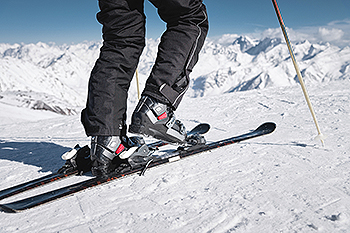
Skiing can place significant strain on the ankles, often leading to soreness or pain, particularly for those unaccustomed to the activity or wearing poorly fitting boots. The repetitive flexing and rotational demands of skiing can stress the ankle joints, ligaments, and supporting muscles. Ankle pain from skiing may result from overuse, improper alignment in ski boots, or injuries such as sprains or strains. Pain often affects the tendons and muscles that stabilize the joint, sometimes accompanied by swelling or difficulty bearing weight. A podiatrist can assess your ankle pain to determine its cause, whether it stems from biomechanical issues, improper equipment, or soft tissue injury. Treatment may involve improving joint stability, recommending supportive footwear, or addressing specific conditions to reduce pain and prevent further complications. If you experience ankle pain after skiing, it is suggested that you schedule an appointment with a podiatrist for an exam and treatment options.
Ankle and foot injuries are common among athletes and in many sports. They can be caused by several problems and may be potentially serious. If you are feeling pain or think you were injured in a sporting event or when exercising, consult with Thomas Bobrowski, DPM from InStride Crystal Coast Podiatry. Our doctor will assess your condition and provide you with quality foot and ankle treatment.
Common Injuries
The most common injuries that occur in sporting activities include:
- Achilles Tendonitis
- Achilles Tendon Rupture
- Ankle Sprains
- Broken Foot
- Plantar Fasciitis
- Stress Fractures
- Turf Toe
Symptoms
Symptoms vary depending upon the injury and in some cases, there may be no symptoms at all. However, in most cases, some form of symptom is experienced. Pain, aching, burning, bruising, tenderness, tightness or stiffness, sensation loss, difficulty moving, and swelling are the most common symptoms.
Treatment
Just as symptoms vary depending upon the injury, so do treatment options. A common treatment method is known as the RICE method. This method involves rest, applying ice, compression and elevating the afflicted foot or ankle. If the injury appears to be more serious, surgery might be required, such as arthroscopic or reconstructive surgery. Lastly, rehabilitation or therapy might be needed to gain full functionality in the afflicted area. Any discomfort experienced by an athlete must be evaluated by a licensed, reputable medical professional.
If you have any questions, please feel free to contact our office located in New Bern, NC . We offer the newest diagnostic and treatment technologies for all your foot care needs.
